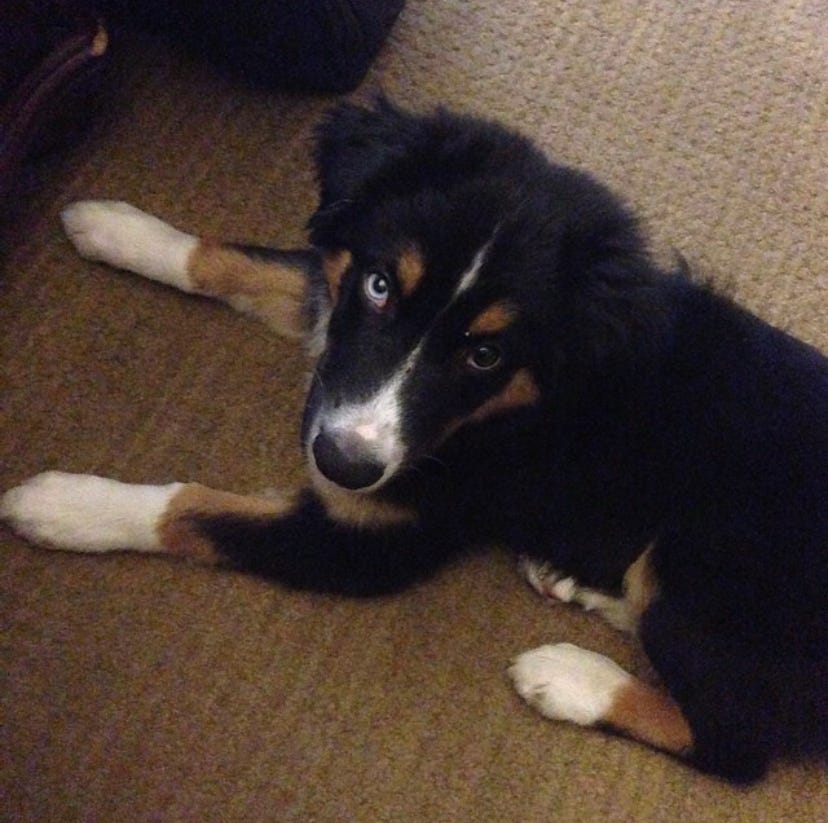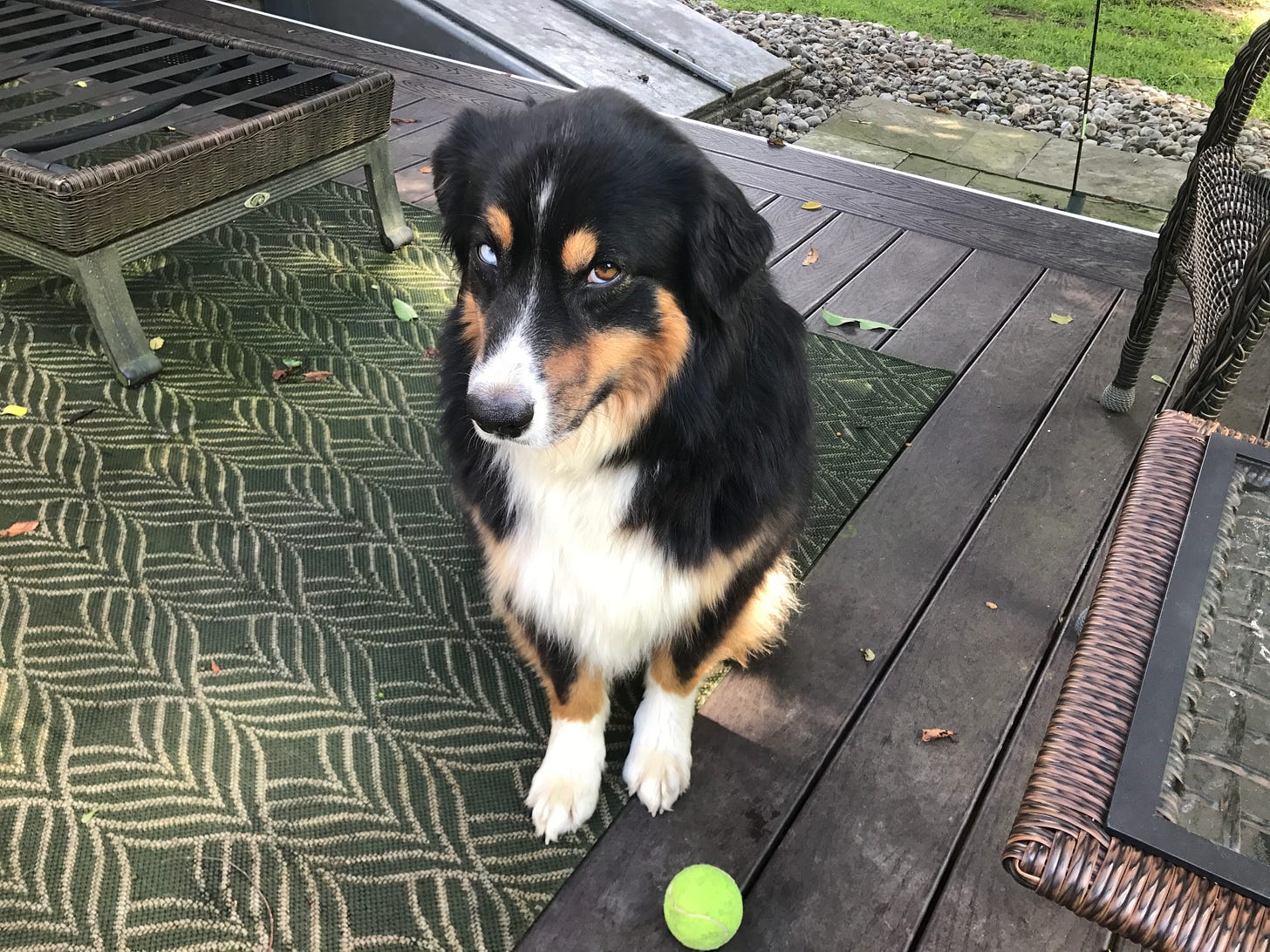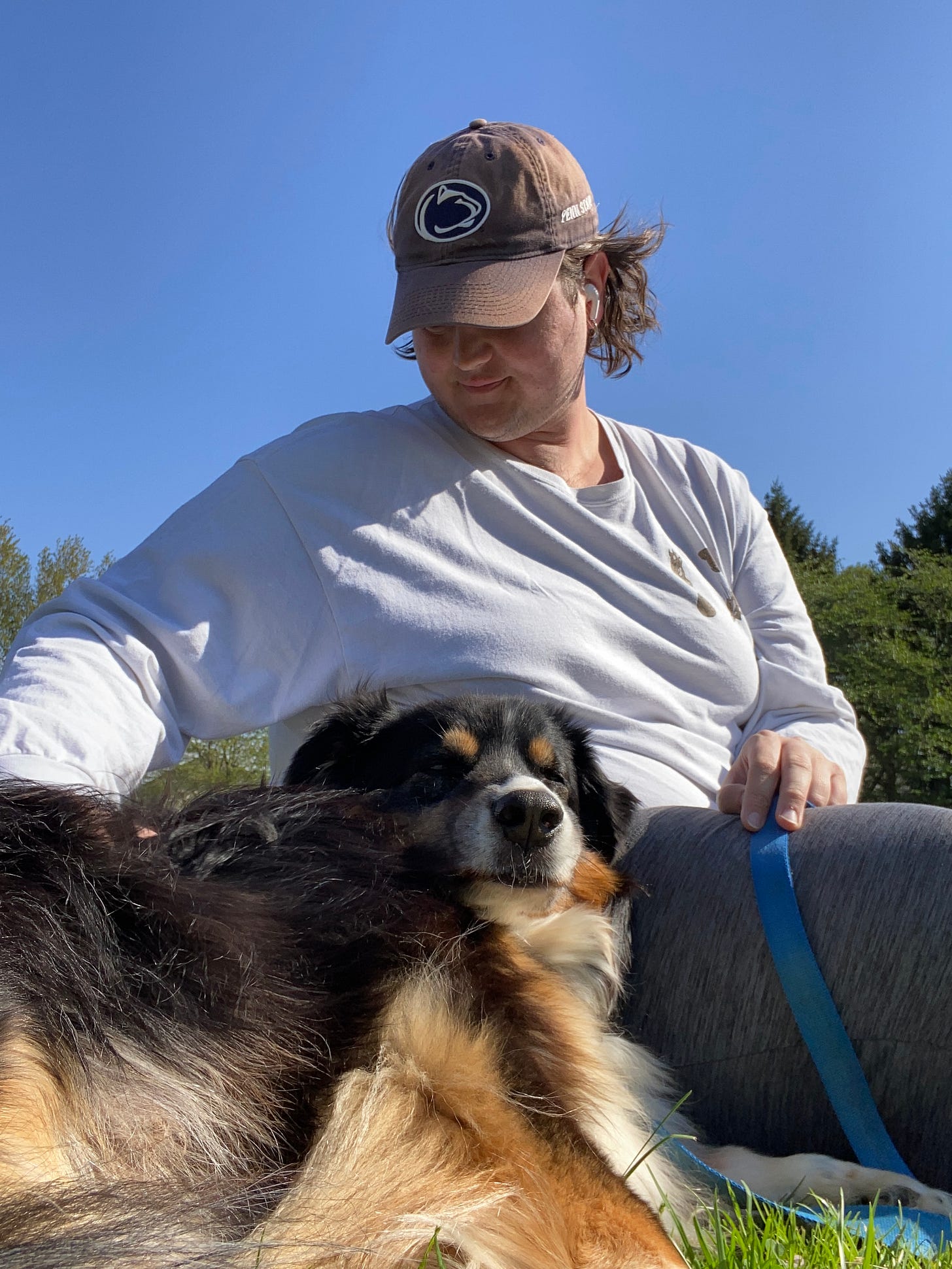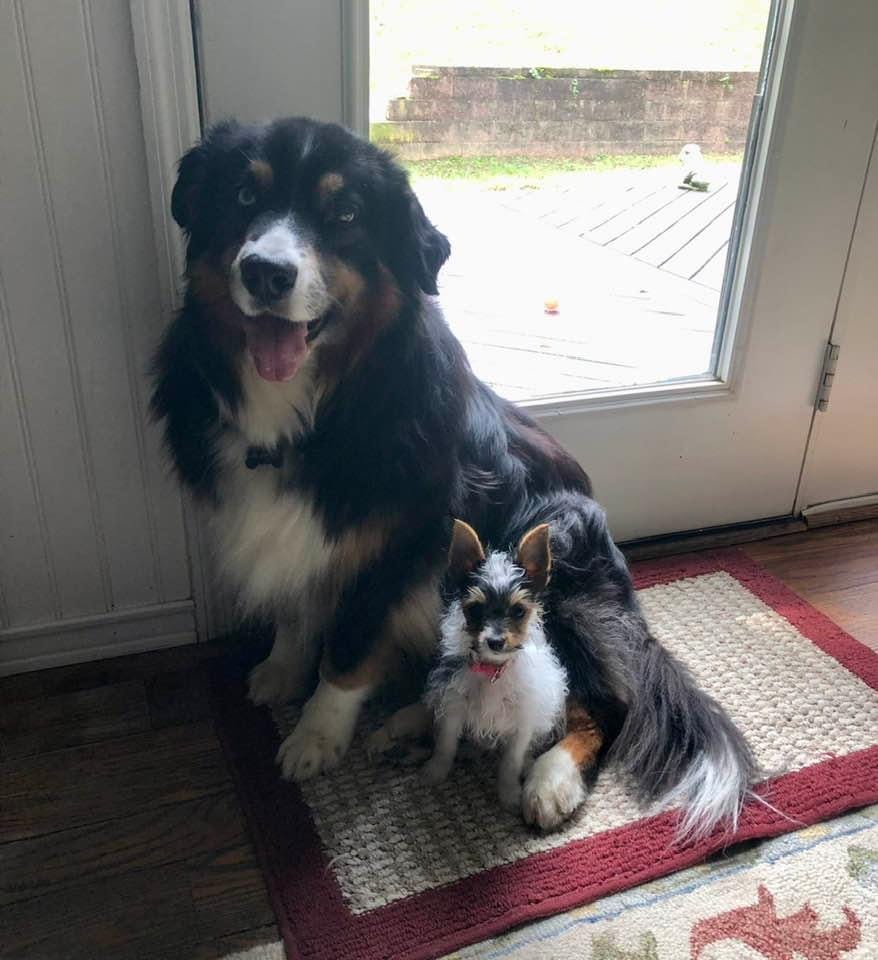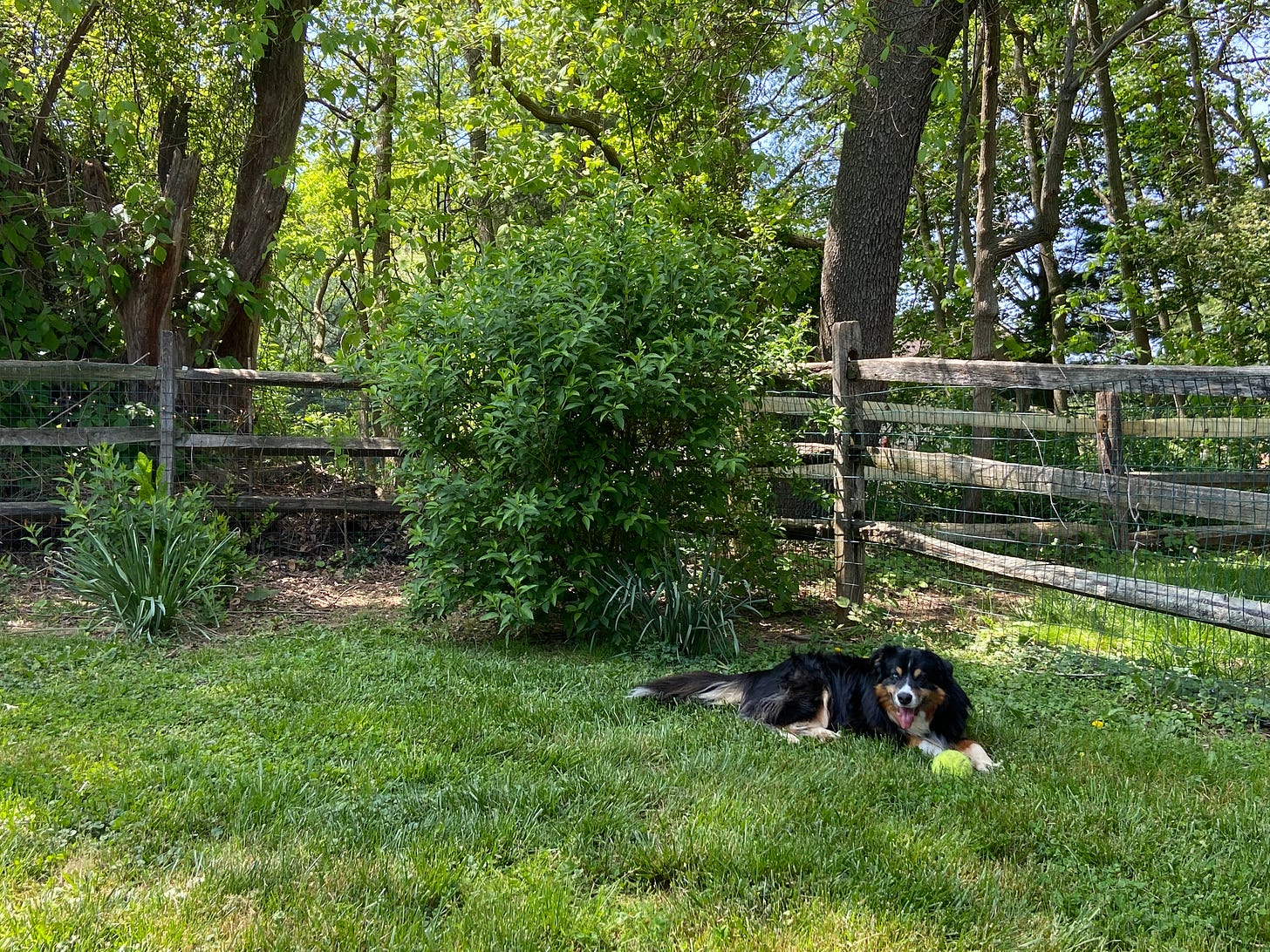Yearning for Magical Thinking
"I miss my dog and I miss falling in love"
I have never been particularly fond of Thanksgiving. This opinion exposes a rare area of disagreement between myself and my mother; she, for some reason, loves that fourth Thursday in November. Whenever I decide to express my distaste for the holiday, which, let’s face it, I am wont to do, it seems that I am always asked, “why don’t you like Turkey Day?” As I resist the urge to ball my hand into a fist and shake it vigorously towards the sky, I remember that, contrary to what elected representatives would make their constituents believe, defending my assertions is, generally, a productive exercise.
Therefore, as I have established here previously, among attributes, uniqueness is one that I particularly admire. While I still stubbornly demand uniqueness from myself and my work, it is no longer an expectation I place on other people, places, and things. Thanksgiving, then, exists as an exception. You see, part of my umbrage with Thanksgiving has to do with the fact that it is utterly devoid of singularity. A day in which you begrudgingly gather with your similarly unsure loved ones and express gratitude? I can name two other holidays off the top of my head which basically call for the same practice; and that is just in the Christian tradition! Both of those holidays, by the way, represent occurrences far more positive than the one commemorated by Thanksgiving. Christmas, for instance, celebrates the birth of a literal savior while Easter exalts said savior’s death and subsequent resurrection. Not to mention that both of these holidays also promise assorted gifts and candies while Thanksgiving promises a lesser poultry dish that proves prone to dryness. I suppose, however, if one considers violent colonization to be their personal lord and savior (as opposed to a mere externality, which it most certainly is in the Christian tradition), then Thanksgiving would, in that case, serve a similar purpose. Then, again, Thanksgiving is not even unique as a celebration of genocide! I mean, hello?? Columbus Day is right there! Consequently, while I am still working on my assessments of its charisma, nerve, and talent, I am assured in one judgment: Thanksgiving possesses absolutely no uniqueness!
Last Thanksgiving, though, gave me a whole new reason to resent the holiday. A reason that, despite my attempt to front-load this essay with some levity, is no laughing matter. That day was like a sucker punch to the gut. It was a day that would change me forever. A day I described in my journal as “a lousy day in the universe[,] perhaps the lousiest one I’ve ever experienced.” That is because last Thanksgiving, my dog, Buddy, died.
I remember the day we got Buddy: October 2nd, 2014. I was in the eighth grade and I had a half-day at school. Before getting in my mother’s car, I stepped off the school bus and descended the hill that slopes down into our neighborhood. I sat in the passenger’s seat and, after seeing my mother, noticed something was off.
“Hi.” I started.
“Hi.” She replied. Both of us sensing the tension, she continued, “look in the back seat.”
There, on the driver’s side, sat a puppy that looked like our Australian Shepherds, Seamus and Paddy. Like Paddy, Buddy was a tri-color. Black fur covered most of his head and his back until it met the white hair that spread across his chest. His face, as well as his legs, had some patches of brown hair, including two ovals that sat on top of his eyes. In other words, he had two little eyebrows, which I always thought was cool. Buddy’s most prominent physical feature, though, were his eyes. While his right eye was brown, his left eye was a really light blue. Because of this feature, I used to affectionately call him “Left Eye” or “Old Marble Eye.”
Obviously, I was immediately electrified. For an eighth grader, a puppy is a very thrilling thing. Hell, even as a twenty-three year old, I still find them quite exciting.
“Is he ours?” I asked my mom, hopeful and optimistic.
“Yes!”
Now, for those readers who do not know, my mother works with horses for a living. Therefore, animals, especially dogs, are an omnipresence in my life. It was not too out of the realm of possibility to have a dog come into our family as a surprise. In fact, since getting Buddy, it’s happened many more times.
That day, Buddy was so scared. I soon understood that fear to be a part of his nature. That partly had to do with his breeding. Australian Shepherds are skittish dogs, which has to do with a herding instinct that is still present in their breed. Although, after driving the few minutes home, I knew Buddy would be especially sensitive. When we let him out of the car, he hid under it. Then, a stream of urine started to seep out from beneath the vehicle. He was only more scared when we introduced him to our other dogs, Paddy and Lola. I remember finding it odd how afraid he was. He did not know how good he was about to have it.
Eventually, we got him in the house and I took him out into our backyard. It is a big yard, and he was keeping his distance. However, his resolve was no match for mine. I like to think that, recognizing his fear, I gave him my undivided attention as a way to make him feel safer; to telegraph to him that he would be safe in this new place. It probably also had to do with the fact that–and here, I will repeat myself–a puppy is a stirring thing for an eighth grader to have. It took a little while but he began to warm up to me in the way puppies do. I remember sitting on the slope in our backyard, enjoying the temperate fall day. He came and sat by me before he eventually laid down next to me, allowing his weight to rest against mine.
Another aspect of that day that sticks out was the debate over what we would call him. At my mother’s suggestion, I wanted to name him “Batman,” which, in retrospect, I will admit would have been weird. Not as weird, though, I would contend, as naming him “Bogey,” which was my brother’s choice. Apparently it is a common name for golfers to bestow upon their pooches. For those who are fortunate enough not to be acquainted with the game of golf, a bogey is when a golfer hits one stroke above par which, in a game wherein the lowest score wins, is not ideal. It would be like if a quarterback named their dog “Safety,” or a tennis player named their dog “Double Fault.” As an eighth grader, it did not make much sense to me and, unlike the name “Batman,” I am standing by that sentiment.
I forget how, exactly, but we ended up on “Buddy.” Despite the name being about as unique as Thanksgiving is as a holiday, it suited him. That is because Buddy was one of the kindest souls I will ever have the honor of coming across in this life. He was the closest we have ever come to having a true family dog. I say this because he was truly devoted to all four of us. My mom used to joke that he viewed us all as sheep in his herd, and, this being so, he took it upon himself to protect us. Therefore, while it became more of a rare occurrence as my brother and I grew older, he was most happy when all of us were gathered under one roof.
While his name may not have been all that distinctive, Buddy was certainly one of a kind. To this day, he is the only dog of ours that successfully learned how to fetch. Other dogs we had had before would run after the ball and pick it up but Buddy was the first one that would actually bring the ball back. Especially when he was younger, I could–and sometimes did–stand outside and throw that ball for hours and he would, without fail, chase after it and bring it back to me. Even as he got older, he still loved chasing that ball. Sure, on any given day, he might have only had one good run in him before he opted to sprawl out atop the hill in our yard; however, even as he grew up, especially when he chased that ball, you could always see shades of that puppy in his heterochromatic eyes and in the strain of his muscles as he jumped to catch the flash of green out of the sky.
Buddy was also unique in how vocal he was. Remember when I said he was a sensitive dog? Well, he verbalized that sensitivity quite often. He would cry when he was excited, or when one of the other dogs would fuss, or when we would talk a little too loudly with each other. Sometimes, he would cry so excessively that we would get a bit annoyed. My dad would exclaim “Buddy” at him in a gravelly voice when it was getting to be a bit too much.
Buddy was also a big groaner. Whenever he would lay down, he would let out a deep *hhhnnnhh*-type noise. He made a similar noise when he would rest his snout on my knee while I ran my hands over the top of his head. Finally, while Buddy was the nicest dog, he was also very suspicious of strangers. He would growl and bark at them, making himself sound much more mean than he was. After all, he was our protector. After a few minutes, though, he would calm down and, even if momentarily, welcome that stranger into the flock.
Then, there were the walks. I have long loved walking around our neighborhood and, one day, I wondered why I never took Buddy along with me. So, that day, he got “picked,” as we call it in my house. He would go absolutely ballistic when he realized it was time for our daily walk. Beside himself with elation, he raced to the door and squealed in excitement. Despite this frantic energy, he was the easiest dog in the world to have on a leash. During the hour and a half we would spend together each day, I often thought about how he did not even really need the leash at all (however, unlike some more irresponsible pet owners, I kept him on one).
Looking back, I am especially grateful for all of that quality time we got to experience in what would be our last year together.
On November 21st, 2023, the Tuesday before Thanksgiving, I was on my way to my job in the city when I got the message from my mother. Or maybe I was already clocked in. Either way, the conversation went like this:
“Buddy got out of the yard. Putting a Facebook post out, but wanted to let you know.”
“When did he get out?” I asked.
“Last night.”
It was two o’clock in the afternoon.
This was not out of character for Buddy. From time to time, we knew him to go on little walkabouts. Sometimes, after letting him out, I would look in the yard and he would not be there. Other times, he would be at the back door and his paws would be dirty or there would be brush caught in the fur behind his legs, Where he would go is anyone’s guess. Why he felt the need to go, I will never understand either. I remember getting mad whenever I realized he had gone on one of his adventures; didn’t he know how good he had it?
I immediately put out my own post on my Instagram Story about him being lost. Hundreds of times I must have refreshed my mom’s various posts on Facebook, seeing if the comments held any new information on his whereabouts. Other dogs had gotten out before. One Christmas, I remember Seamus and Paddy being found at a Wawa a mile away from our house. I am not going to say I had an exceptionally bad feeling; I can’t confirm that. What I can confirm is that I’ve never loved a dog like I loved Buddy, and that all I wanted, in that moment, was for him to come home.
We got the call on Thanksgiving. My mom and I were at a party that I still hope we didn’t ruin. Once she picked the call up, I knew it was about Buddy.
“Is he alive?” I asked, not being able to tell from her side of the conversation.
“No.” My mother said, beginning to cry.
And there we stood in a front yard, holding each other, sobbing.
We went to the barn out of which my mother runs her business. While she went to get Buddy, I sat there alone. I decided not to go with her. I did not want to see him like that; I did not think I could handle it. Eventually, not knowing what else to do, I turned to one of my coping mechanisms: music. I put on my sad music playlist and the first song to play was the Glee Cast Version of James Taylor’s “Fire and Rain,” which was featured in the episode that paid tribute to Cory Monteith after his sudden death. Even then, I knew there was something funny about the first song on the shuffle being a Glee Cast Version. That did not stop me from bawling my eyes out to it, especially when I heard the last words of the chorus: “But I’d always thought that I’d see you again.”
It goes without saying that I was devastated. I remained that way for a while. In some way, I thought I had failed him. “I just feel so bad for him,” I wrote after the fact. “I cannot imagine how scared he must have felt these past few days. The fact that I couldn’t protect him like he protected me is a horrible realization.” I had lost pets and even human family members before, but this was, without question, the most challenging grieving process I had ever been through. Perhaps it was how suddenly it had all happened. In the past, I had had time to wrap my head around the fact that those I had lost would soon be gone. This time, I was given two days. There was also the fact that it happened in such a unique time in my life. When Buddy died, I had only been living in New York full-time for three weeks. To say it was a lot of change to go through all at once feels like a vast understatement. I remember feeling incredibly destabilized. In some ways, six months on, I still do.
Sometime in the year prior, I had bought Joan Didion’s The Year of Magical Thinking for one dollar at The Hockessin Bookshelf. When the cashier saw the color of the tag on the book, she remarked, especially considering its condition, how good of a deal I was getting. From what I had read about the work, I knew that it was about grief. More specifically, Didion’s novel chronicles the year after the sudden death of her husband, John Gregory Dunne. Early in the novel, Didion describes struggling as she attempts to pack up John’s closet. “I could not give away the rest of his shoes,” Didion wrote. “I stood there for a moment, then realized why: he would need shoes if he was to return.”1 The titular “magical thinking,” then, refers to that idea of Didion’s; that, at some point, her late husband might come back.
While I enjoyed reading Didion’s writing, I could not relate to her brand of “magical thinking.” This is ironic because, throughout my life, I have indulged in many other types of magical thinking. For instance, I believed in Santa Claus for as long as I could. Even now, I have an astrology app that sends me push notifications about the planets and the supposed impacts that their various transits have upon me. However, Didion’s version of magical thinking was antithetical to the understanding I had had of death since I first learned about the concept. Even at that young age, the most profound aspect of death, to me, was the fact that I would never again be able to speak with someone who died. For some reason, it was not the fact that I would never see a dead person again; instead, what stuck with me was the end of the conversation. When something died, so too did the possibility of an interaction with that being. Put another way, unlike Didion, when they died, I was under no illusion that I would ever speak to my grandmother, Peg, or my uncle, Jonathan, or my grandfather, Bob, again. To put it in the context of this essay, as much as I wished it was not the case, I would never again be able to throw the ball for Buddy and watch him chase after it. When I opened the door to the back yard, I would no longer hear his anxious cries. And, if I were to ever walk a dog around my neighborhood, it would not be him. As much as I had wanted him to, Buddy was not coming back. It isn’t how it works.
I do not profess to know what happens to someone when they die. In fact, as a person who tries their hardest to keep their sanity intact, I try not to think about it often. However, what I do know is that, in some ways, the dead do live on. While those I have lost are no longer physically with me, I do still find myself looking for signs of them. For instance, I knew it was time to write this essay when I picked up a shift at my old job two weekends ago. Twice a year, my place of work hosts a dog-themed festival. Customers are encouraged to bring their dogs onto the property and, in addition, they usually try to partner with dog rescues that bring adoptable pups. I was standing behind the bar, pouring a glass of wine, when the live musical duo started to play a song I knew I recognized. They started singing, “just yesterday mornin’, they let me know you were gone, Suzanne, the plans they made put an end to you.” It was “Fire and Rain.” The first song I listened to after we got the call about Buddy. I had to stop what I was doing for a second and live in the magic of that moment. A moment in which, most powerfully since he died, I felt Buddy was with me.
Now, do I think Buddy’s spirit was sending me a message? I’m not sure. Was he paying me a visit from beyond? I do not know. What I do know is that that dog left an indelible mark on me. I also know that, even if I cannot throw a ball for him, or listen to him cry, or take him on a walk, I do carry him with me. He’s alive in the faces of the dogs I pass on the streets, and in the touch of a tennis ball, and in the lyrics of “Fire and Rain.” In a similar way, my grandmother is alive in my and my mother’s smiles. My uncle is alive in that University of Delaware Blue Hen mask somewhere in my family’s home. And my grandfather is alive in the pennies he left in a mailbox-shaped bank of his that ended up in my possession. As long as I am here, I know they will live on in my memory. They are all a part of me. In that way, everyone who knows me will also know them. Isn’t that a beautiful way to live on?
This week’s recommendations:
This interview about the costuming in Challengers
Dua Lipa’s Radical Optimism, particularly track number four, “These Walls”
Iga Swiatek and Aryna Sabalenka having a good, old-fashioned queen-off in the Madrid Open final
Season One of Hacks on HBO
Didion, Joan. The Year of Magical Thinking. Vintage, 2006.




